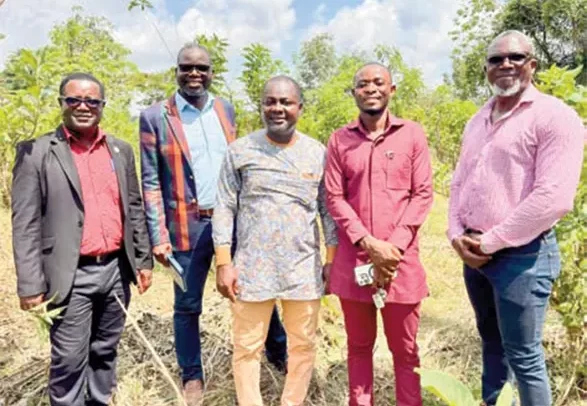Dr. John Mponda (2nd left) with Dr. Ebenezer Agyemang (2nd R) and other members of the delegation
The founder of HEPA Plus, Dr. Ebenezer Agyemang, has earned strong commendation from a visiting Malawian delegation for establishing one of Ghana’s most exemplary medicinal plant farms—an initiative they described as a major milestone in Africa’s herbal medicine industry.
The delegation, led by Dr. John Mponda, a pharmacist and lecturer from the Kamuzu University of Health Sciences (KUHeS) in Blantyre, Malawi, said Dr. Agyemang’s 20-acre organic medicinal plant farm represents the kind of bold investment African nations must pursue to guarantee quality herbal products from the source.
“We are highly impressed. You cannot talk about quality herbal medicine without talking about where the raw materials come from,” Dr. Mponda stated. “What Dr. Agyemang has done here is remarkable and something many African countries—including Malawi—must emulate.”
The farm, which supplies raw materials for the production of Hepa Plus, Plasmox, and Pavi, strictly adheres to good agricultural practices, avoids pesticides and synthetic fertilisers, and maintains organic cultivation standards. The delegation observed that such practices eliminate contamination—one of the leading challenges in herbal medicine across the continent.
Dr. Agyemang explained that the motivation for establishing the farm began in 2020, driven by the need to reduce contaminants and secure reliable raw materials. Heavy metal pollution from galamsey and the use of agrochemicals by external suppliers had made sourcing clean plants increasingly difficult.
“Medicinal plant cultivation is not like ordinary farming. You cannot rely on chemical weedicides or inorganic fertilisers. True medicinal farming demands manual weeding, careful soil management, and strict organic practices,” he said.
The Malawian team, currently in Ghana on a benchmarking and learning mission, praised the company’s adherence to both good agricultural practices (GAP) and good manufacturing practices (GMP), describing the setup as “ideal for training, research, and international collaboration.”
Led by Dr. Mponda—a pharmacist and specialist in traditional medicine—the delegation is studying Ghana’s herbal medicine training model, quality-control systems, and regulation. Their visit forms part of Malawi’s broader effort to strengthen its herbal medicine sector through new legislation and institutional reforms.
The team visited the Kwame Nkrumah University of Science and Technology (KNUST), the Centre for Plant Medicine Research, and several herbal industry partners as part of their mission. Dr. Mponda said Ghana remains the benchmark for Africa, commending the country for its advanced policies and structures governing herbal medicine practice.
“Ghana is far ahead of many African countries in the way it manages herbal medicine, the training of practitioners, and the regulation of products,” he noted. “We believe partnerships with institutions like KNUST and companies like Ebenage Herbal Production and Consult (producers of Hepa Plus, Pavi and Plasmox mixtures) will help Malawi build a stronger industry.”
Head of KNUST’s Herbal Medicine Department, Dr. Kofi Turkson, also lauded Dr. Agyemang’s initiative, describing the farm as a crucial intervention at a time when environmental degradation threatens the herbal sector.
“With galamsey destroying forests and polluting water bodies, it is dangerous to harvest medicinal plants from contaminated areas,” he warned. “Farms like this provide clean, reliable sources of raw materials and create opportunities for employment, export, and national economic growth,” he stressed.
The delegation said their key takeaway from Ghana is the need for African countries to invest in clean, controlled cultivation of medicinal plants and to deepen partnerships with institutions leading the way.
Their visit, they added, will shape Malawi’s upcoming reforms aimed at revitalising its traditional medicine industry.
FROM David Afum, Kumasi


